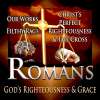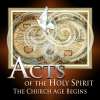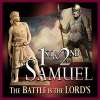
Thursday, August 18, 2011
by Robert Dean
Passage: Romans 3:1-12
Series: Romans (2010)
Duration: 1 hr 4 mins 43 secs
"There is none righteous, no, not one." We have all heard of total depravity, but what does that really mean? Romans 3 is perhaps one of the most debated chapters in the Bible with regard to the beliefs associated with Calvinism. Many arguments come out of what Paul says about faith. In this lesson, we are introduced to how truth, faithfulness, and righteousness are connected, and how closely related faithfulness is to truth. The ten rhetorical questions Paul poses in the first ten verses of this chapter merit a lot of consideration and investigation.

Thursday, April 19, 2012
by Robert Dean
Passage: Romans 5:8-12
Series: Romans (2010)
Duration: 59 mins 50 secs
What do justification, reconciliation, and hope have in common. In this class we learn how Paul connects these to the cross and the so great salvation we have "in Christ." Only by living in light of this reality can we "be saved," i.e., be delivered from God's discipline and judgment in time ("wrath").

Tuesday, March 26, 2013
by Robert Dean
Passage: Acts 14:12-28
Series: Acts (2010)
Duration: 59 mins 30 secs
Paul and Barnabas Bear Witness to God’s Grace
Fleeing Iconium one step ahead of a murderous plot against them, Paul and Barnabas arrive in Lystra. There they heal a crippled man. The pagan crowds see this and go wild, wanting to worship them as gods with parades and sacrifices. Paul seizes the opportunity to tell them the gospel. Since the people have no Jewish background, Paul must start at ground zero with their innate understanding of God through creation. This lesson answers many questions relevant to our lives today. What does Paul mean when he says this man was crippled from his mother's womb? Is he implying that life begins at conception? Why isn't everyone healed? How should the gospel be presented to those who have no background in reference to the true God? How can creation be used as a tool when we are talking about God to multi-cultural, multi-religious people like the ones we encounter in our daily lives?

Tuesday, November 22, 2016
by Robert Dean
Passage: 1 Samuel 19:1-24 & Psalm 59:6-17
Series: 1st and 2nd Samuel (2015)
Duration: 56 mins 40 secs
Will we see our enemies who treat us unjustly get punished? Listen to this lesson to see that we must learn to trust God and have confidence that He will dispense justice whether we see it or not. Find out that God always provides for believers no matter what the circumstances. Learn what wrath means and whether it involves emotion. Remember that no matter what happens to us we are to turn to God and trust Him.